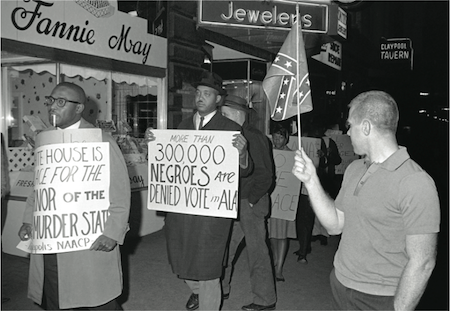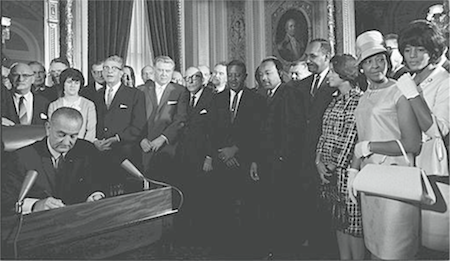February 20, 2015

A man held a Confederate flag as demonstrators, including one with a sign saying "More than 300,000 Negroes Are Denied Vote in Ala," marched in front of an Indianapolis hotel where George Wallace, the governor of Alabama, was staying in April 1964. Credit Bob Daugherty/ Associated Press
In December, I wrote an article titled “Evidence That the Jim Crow Era Endures for Older Black Voters in the South.” The article, based on voter registration and census data in Georgia, noted that older black voters who reached voting age before the passage of the Voting Rights Act were significantly less likely to be registered to vote compared with whites of similar age and black voters who reached voting age in the years afterward.
The implication, I wrote, was that black registration and turnout rates were suppressed by the lingering effects of Jim Crow laws, which disenfranchised African-American voters. The evidence underlying that statement is research suggesting that voting is a habit. Therefore, someone with fewer opportunities to register and vote should be less likely to vote than a similar person who had more opportunities.

President Lyndon B. Johnson signs the Voting Rights Act of 1965 into law. (Yoichi R. Okamoto)
It is somewhat more complicated. Data and analysis from four political scientists suggest that the lower rate of registration among older black voters might not be because of disenfranchisement under Jim Crow.
Ryan Enos, Andrew Hall and James Feigenbaum of Harvard and Anthony Fowler of the University of Chicago looked at the question using a different data set, the Catalist voter file. Catalist data has a big advantage over state voter files: It includes estimates for the race of every registered voter. That’s useful because only a handful of states, none of them outside the formerly segregated South, ask voters about their race. The Catalist data allows a comparison between black voters in and outside the South that isn’t possible with official voter registration data.
The researchers found that older black voters in the Deep South were just as likely as similar voters outside the region to be registered to vote. Older black voters in the formerly segregated South may be about a point less likely to be registered to vote, but the finding was not statistically significant. Older Northern black voters are also less likely to be registered, in numbers similar to their Southern peers, even though they were not subject to the same disenfranchisement. That’s not what we would expect if Jim Crow still had a lingering effect on black turnout and registration rates.
The Catalist data is not perfect. Bernard Fraga, an assistant professor of political science at Indiana University, estimates that only 79 percent of black voters were correctly identified as black by the Catalist model.
My sense, based on many conversations with users of Catalist data and other modeled-race data (I have never used Catalist data), is that the Catalist estimates aren't good enough to definitively resolve the issue. What does that mean for the Jim Crow effect? In my mind, the findings don’t entirely rule out the possibility of a Jim Crow effect, but they raise a lot of doubt about it.
If there isn't a Jim Crow effect, then we’re left with a new question: Why not? One explanation is somewhat paradoxical: Jim Crow may have disenfranchised voters, but it also energized and mobilized them to political engagement. According to this hypothesis, the civil rights movement and post-Voting Rights Act of 1965 voter registration drives mobilized enough black voters to cancel out any penalty from previous disenfranchisement. The civil rights movement might have also done much to mobilize black adults in the North who had lived through the Jim Crow era.
That’s a plausible part of the explanation, but it probably isn't the whole one. Census Bureau data on black turnout in elections after the Voting Rights Act shows that turnout among Southern black voters still trailed that of Northern black voters, as well as that of the white population, in the 1968 presidential election and for decades more.

